- Home
- Fredric Brown
Compliments of a Fiend Page 2
Compliments of a Fiend Read online
Page 2
“I know you're just kidding, Ed. You can't interpret the signs of the zodiac that literally; they don't mean that at all. But you are right that without a specific birth date—and preferably the hour and minute of the day and the place of birth; all that makes a difference, you know—I couldn't make a good enough horoscope to be much help in finding some specific point. Of course I might get a cross reference from your horoscope; anything that happens to him would affect you, too. But I'll admit that it's a pretty slim chance that I'd get anything definite enough to be helpful.” I said, “Let's skip it, then.”
“All right. But is there anything else I can do? I don't mind missing the poker game; I'm not too crazy about playing tonight anyway. You going out looking for him if he doesn't show up?”
I looked at my watch and said, “Not for almost an hour. If he isn't home by eleven, I'll start doing something about it. But I think I'll have company—our boss. He'll want a hand in things if anything's really happened to Uncle Am.”
Karl nodded. “I'd be a fifth wheel in that case. Okay, I'll tool along and play poker. In a few minutes, that is; they aren't going to start till ten-thirty, and it's only a few blocks.”
“Going to win?” I asked him.
“How the hell do I—” He broke off, and grinned. “I see what you mean. As a matter of fact, this is a moderately lucky day for me; I probably will come out ahead. But things like that can be foretold only in a general way. Particularly poker.”
“Why?” I asked.
“Well—for one thing, I may be better off in the long run to lose a few dollars than to win.”
“Sounds like rationalization to me,” I said. “But that wasn't quite what I meant. I meant why did you say particularly poker?”
“Because poker isn't entirely a matter of luck; it's a matter of judgment of the value of your cards compared to the other guy's cards. And you can have luck, in the sense of getting good hands, and still lose in the long run if you use poor judgment on how to bet the cards.”
“Then astrology would be more helpful in playing roulette? Look, I'm not trying to heckle you; I'm honestly curious to get your point of view.”
He grinned. “Even though you think it's wrong? Yes, astrology would be more helpful in roulette, because—except for the help that astrology could give you— that's pure chance. If a player played only on days what were favorable days for him, he ought to be able to beat the law of averages and the house percentage— in the long run, of course.”
“Then why aren't all astrologers rich?”
“For one reason, Ed—I know this may sound silly to you—anyone deeply enough interested in the spiritual things of life to become an astrologer would recognize that living from gambling wouldn't make him really happy in the long run. It's not real; it's not constructive; it doesn't contribute to the welfare and progress of the world. That may sound idealistic to you, but it's sound. Astrology is a guide to a good way of life, and it would be a false guide if it showed a man how to live a life that isn't constructive.”
I said, “That doesn't sound silly to me. I wouldn't want to make a living that way myself. But I wouldn't mind knowing a few lucky numbers, so I could pick up enough capital to make a living the way I'd like to.”
“You don't like being a private detective? I thought you did.”
“I do. But I'd rather work for the Hunter Agency than for Starlock. Uncle Am and I are trying to save up enough dough to go into partnership on an agency of our own, but it's tough going. I guess we like to spend money too well to enjoy saving it. Anyway, the bank account is a long way short of the mark.”
He looked at me very seriously for a moment and then said, “Maybe I can help you on that.”
“How? I don't get it.”
“I'd better not tell you now. I'd better go if I'm going to make that game on time. Look, you want the address? I mean, if your uncle shows up and is all right, then maybe you'll want to come and play a while.”
“Thanks, but I'd better not. Be pretty late by the time I got there, and I have to get up early.”
“Okay, Ed. Maybe you're saving money. Got a hunch I'm going to take the boys tonight.”
At the door, he turned. “Uh—I hope your uncle shows up okay, Ed.”
“I guess he will,” I said, and then as he started to close the door, I told him, “Leave it open, Karl. I want to be sure to hear the phone if it rings.”
After I heard Karl Dell go out the door downstairs, I began to wonder again how time could go so slowly. It wasn't quite half past ten.
A few minutes later the phone rang, and I got downstairs in nothing flat and answered it before Mrs. Brady did.
But it wasn't Uncle Am; in answer to my hello, Ben Starlock's voice said, “That you, Ed?”
“Yes. Heard anything?”
“No. I guess you're worried, and I'm getting that way myself. Shall we start checking up now instead of waiting another half hour?” Swell. Shall I meet you somewhere, or what?”
Not right away. Let's see what we can do with a few phone calls first. Suppose you call—No, wait. I'd better call our client—or prospective client—first. It just could be that Am is still with him or that he can tell us what the score is. You hang up, Ed, but stick by the phone; I'll call you back in a minute or two.”
I said “Okay” and hung up. I sat down on the bottom step of the stairs for a minute or two and then went back and stood by the phone.
So when it rang I was right there.
Starlock said, “Ed, it isn't so good. Now wait; I don't mean I've got bad news. But there isn't any such guy registered at the hotel.”
“He gave you the hotel address this afternoon,” I said. “Maybe he could have checked out since.”
“No, I asked that. I don't like the looks of it, Ed. How about meeting me down at the office? I can think better there and we can use it as a base for operations. I imagine we can do more on the phone than otherwise, till we get lead or an angle to dig in on.”
“Fine, Mr. Starlock. How soon?”
“Half an hour if I take a cab. You can walk it in that, so you won't need to hurry.”
But I wanted to hurry; I wanted to do something right away, only I couldn't even get into the office until he got there with the key. I said, “Isn't there something I can do first, to get us started, before I meet you?”
“Not a thing, Ed. Let's not get excited on this; let's get together and dope out what we're going to do, before we go off half-cocked.”
“All right,” I said. “But give me something to be doping out. What hotel was this alleged client supposed to be staying at?”
“The Gresham, just a few blocks from the office. He said Room four-eighteen.”
“And gave a name?”
“Yes. An odd one, now that I come to think about it. And his first name was Ambrose, like your uncle's.”
“And his last name?”
“An odd one—Collector,” Ben Starlock said. “Ambrose Collector.”
Chapter 2
I TOOK A DEEP BREATH and said, “All right, Mr. Starlock. I'll see you at the office in half an hour.”
I hung up the phone and deliberately made myself stand there and count ten slowly before I moved.
That way, I didn't rush out and leave loose ends. I knocked on Mrs. Brady's door and told her that if Uncle Am phoned she should tell him to phone the Starlock office and if no one answered there to keep trying. I went upstairs and wrote the same thing in a note, so if he came home instead of phoning he'd get that message even if Mrs. Brady didn't see him coming in.
I put the note where he couldn't miss it and tried not to think that he'd probably never see it.
And I held myself to a normal pace as I went down the stairs out into the night. At State Street I caught a cab and gave the driver the address of the barbecue place on Clark where Estelle worked. Outside, I told him to wait, that I'd be out in a minute.
Estelle looked up, surprised, when I came in. She was off duty for the moment, eating a sandwich on the stool at the far end of the counter.
I hurried back to her and didn't waste time on any preliminaries. I said, “That gag you pulled tonight about an Ambrose Collector, 'Stelle; where'd you get it? What's it about?”
Her eyes got wide as she looked at me. “I—What do you mean, Eddie?”
“Early this evening,” I said patiently, “I told you Uncle Am hadn't got home. You said maybe the Ambrose Collector got him.”
“It was just a joke, Eddie. Isn't he home yet?”
“He isn't. What about the Ambrose Collector? It was a joke, but where did you hear it? You didn't make it up, out of a clear sky, did you?”
“N-no. Somebody mentioned an—an Ambrose Collector to me recently, but I can't remember who it was.”
“It's important, 'Stelle. Try hard.”
“It had something to do with a book somebody was telling me about. But I can't remember who—
“You've got to.”
“I—I can't, Eddie. I'll think of it later, maybe, but—” She looked at me helplessly. “Can you get off work now? It's nearly eleven; the rush ought to be over by now, hadn't it?”
“Sure.” She got up off the stool. “I'll get my coat and tell the boss. He's back in the kitchen.”
She was back in less than a minute, a light coat thrown over her uniform.
In the cab, on the way to the office, I told her what little I knew thus far, and it made me realize how little that little was.
She squeezed my arm suddenly. She said, “Eddie, maybe—
“Maybe what? Go ahead and say it.”
“No, it's wrong. I was going to say maybe Uncle Am was being funny, playing a joke on you and your boss. But—no, he wouldn't be, not that way.”
I thought it
over. “No, he wouldn't,” I said. “He's got a screwy sense of humor all right—one that might tie in with the idea of an Ambrose Collector, whatever an Ambrose Collector is, but he wouldn't play any joke that would worry me this much. Could it have been Am, though, who mentioned the Ambrose Collector to you? That part of it sounds like him.”
She shook her head slowly. “No, it wasn't Am. I—I'll think of it, Eddie. I almost had it, then.”
I opened my mouth to tell her to keep trying, and then shut it again. She'd think better if I didn't talk to her.
In spite of my stopover for Estelle, we got to the office ahead of Starlock. The elevator operator—the redheaded one with whom I'm usually on friendly and kidding terms—gave us a funny look, obviously wondering—or not wondering—why I was taking a girl up to the office at that time of the evening.
I gave him back a glare for the funny look, almost hoping he'd crack wise so I could tell him off or take a poke at him; I wasn't feeling on friendly or kidding terms with anyone right then.
We waited in the dim corridor outside the office door for only a few minutes before Ben Starlock got off the elevator. He's got a good poker face and managed not to seem surprised at my having a girl with me.
I introduce them and then, as Starlock was opening the door with his key, I said, “I didn't take time to tell you on the phone, but when you said the guy who called you used the name Collector—Ambrose Collector—it rang a bell. I'd heard of an Ambrose Collector earlier this evening—from Estelle here. That's why I brought her.”
Starlock closed the door and turned to stare at Estelle.
She said, “I can't remember where; I've been trying to. It was in the back of my mind—from somewhere—and when Eddie told me, while he was eating, that Am hadn't come home yet, I said maybe the Ambrose Collector's got him. But I'll keep trying; I'll think of it sooner or later.”
Starlock nodded. “I'm sure you will, Miss Beck. Want to go in the back room— the ops' room—and sit there alone for a while to see if it comes to you?”
Estelle looked at me and I could see she didn't want to, yet.
I said, “Let's let her in on it, Ben”—it was the first time I'd ever called him by his first name—“while we compare notes and put together what little we've got to go on. Maybe something about your conversation over the phone will give her an idea.”
Starlock looked at me a moment and I could see what he was thinking, so I said “It's all right. Am and I have known 'Stelle for years; she was at the carnival we were with and quit and came to Chicago the same time we did. She's okay, and she knows how to keep her mouth shut.”
He frowned a little, but he said, “Okay, Ed, if you say so,” and opened the door of his private office.
We went in and Starlock gave Estelle a chair and then sat down behind his desk. The swivel chair creaked in agony as he leaned back and put his hands behind his head, staring over us at the transom of the door. He looked—even to a small pimple above the bridge of his nose—like an oversized, benign Buddha.
I'd sat down, too, but I stood up again. I knew he was thinking, but I wanted to be in on what he was thinking about, so I said, “Do it out loud.”
Starlock said, “Be patient, Ed. Jane's on her way here; I phoned her just before I left, and she'll be here in a few minutes.”
“How come?” I asked. Jane Rogers is Starlock's secretary.
“Partly to take notes. I think I can still repeat that conversation almost word for word, and I want to get it down that way while I remember it. And then I want her to stay by this phone, all night if necessary. We may be going out together or separately and if it's the latter we want to be able to keep in touch through Jane. And then, too, I left word at home to tell Am to call here if he called there. Did you do the same at the rooming house?”
I nodded, glad I'd had sense enough to stop and count ten after the phone call, so I'd thought about that, and leaving the note. I told Starlock about the note, and just as he was saying “Good,” Jane came in.
Starlock must have told her what the score was, because she didn't ask any questions. She said “Hi” to us and got her notebook right away.
Starlock said, “Take every word of this conversation, Jane. You'll have all night to transcribe it, after we leave. And you're going to be the first one to talk. Can you talk and write what you're saying in shorthand at the same time?”
“I guess so.”
“All right, try it. You answered the phone when that call came at four o'clock. Tell us every word of it you can remember, every little detail about it.”
Jane nodded. “It was just about one minute before four o'clock; I know because you'd told me I could— But you know about that.”
“Ed doesn't,” Starlock told her. “And anyway we want it in the record.”
Jane looked up at him and then down at her notebook again. “You'd told me I could leave at four because of my appointment with the dentist, so at one minute of four I was conscious of the time; I was putting the cover over my typewriter when the phone rang.”
It was strange, somehow, to listen to her talking and to watch the flying tip of her pencil, to know the two were coordinating; it was almost as though the pencil was doing the talking.
“I picked up the phone,” she said, “and said 'Starlock Agency.' A man's voice said 'Ben Starlock, please.' I didn't recognize the voice; I don't know whether or not I'd know it if I heard it again. I don't think I would. I mean, it was a fairly average voice, if you know what I mean by that; there wasn't anything special about it to remember.”
“Anything about the inflection you can remember?” Starlock prompted. “Yes; he spoke confidently, as though he knew you and expected to be put through to you right away. 'Ben Starlock, please.' Well, you know my instructions on phone calls, but Ed doesn't, so I'd better put that in. I'm not to put any call through to you without knowing who's calling, and if there's any doubt whether you might want to talk to them, I say, 'Just a moment, please,' and then ask you, so they can't hear, if you want to talk to them.
“So I said, 'Who is calling, please?' He said, 'My name is Collector, Ambrose Collector.' I wasn't sure I'd heard him just right even though he'd said it twice; I guess because I'd never heard of anyone with that name. So I asked him, 'Will you spell that, sir?' he said, 'C-o-l-l-e-c-t-o-r. I'd like to talk to Ben Starlock about a job I might want him to handle for me.'
“So I said, 'Just a moment, please,' and put my hand over the mouthpiece of the phone and told you that a Mr. Ambrose Collector was on the line and wanted to talk to you about a job he might want you to handle for him. And you looked up from whatever you were doing and said, 'Okay, Jane, put him on.' But before I did, I asked you if you wanted me to stay and take notes on the conversation and you shook your head and said, 'No, you run along; it's four o'clock.' So I switched the call to your phone and heard you say 'Starlock speaking,' and I didn't listen to any more of the conversation; I put on my coat and hat and left.”
Starlock said, “Good report, Jane.” He leaned back in his chair again, staring at the transom. “I said, 'Starlock speaking.' A masculine voice—and I can't describe it any better than you did, Jane—said, 'My name is Collector, Mr. Starlock. I'm looking for a detective agency that can handle a certain job for me.' I asked him what kind of a job it was; he said—in effect; I'm not sure of the exact words—'It's rather too complicated to explain over the phone, Mr. Starlock. It's an honest, legitimate job. But it hinges on your being able to furnish an operative with a certain qualification. Yours is the third agency I've tried.'
“I asked him what the special qualification was and he said he needed a man with lots of carnival experience, one who'd traveled with a lot of carnivals and knew a lot of people in that game.”
Starlock closed his eyes and then opened them and was looking at me. He said, “If it was a put-up job to get Am, then that insistence on a lot of experience was to eliminate you, Ed. You spent one season with the carnival, but Am was in it for years. You see what I mean.'
I nodded.
He said, “I told him we had an operative who filled the bill very well, who'd had ten years or more experience as a carnival concessionaire.”
“Did you mentioned Uncle Am's name?” I asked.

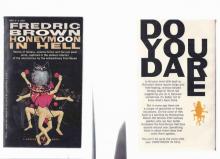 Hall of Mirrors
Hall of Mirrors Honeymoon in Hell
Honeymoon in Hell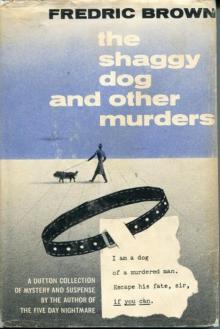 The Shaggy Dog and Other Murders
The Shaggy Dog and Other Murders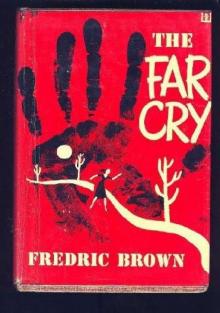 The Far Cry
The Far Cry Arena
Arena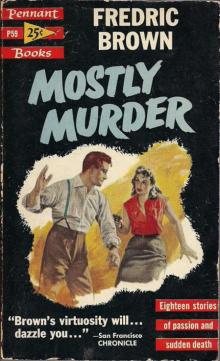 Mostly Murder
Mostly Murder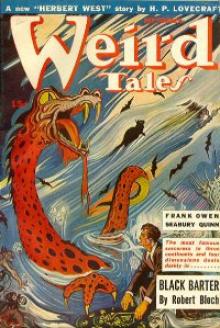 The Geezenstacks
The Geezenstacks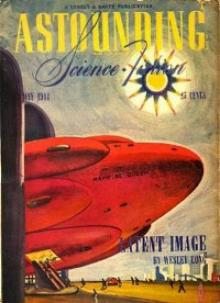 The Yehudi Principle
The Yehudi Principle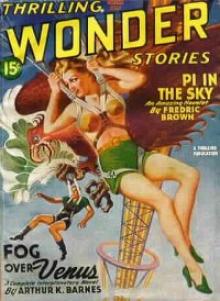 Pi in the Sky
Pi in the Sky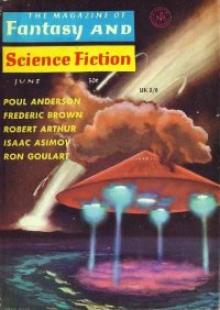 Eine Kleine Nachtmusik
Eine Kleine Nachtmusik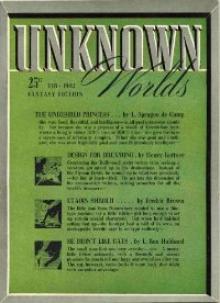 Etaoin Shrdlu
Etaoin Shrdlu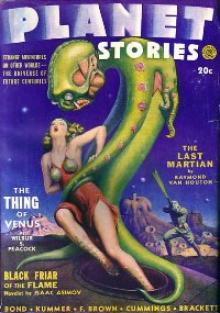 The Star Mouse
The Star Mouse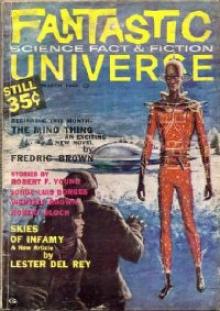 The Mind Thing
The Mind Thing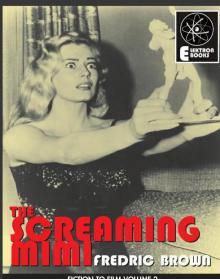 The Screaming Mimi
The Screaming Mimi The Fabulous Clipjoint
The Fabulous Clipjoint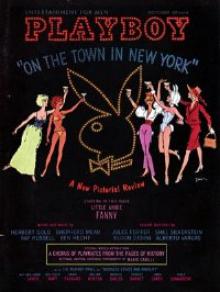 Puppet Show
Puppet Show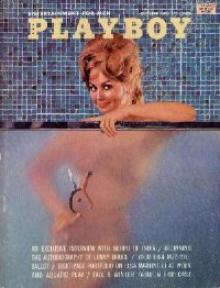 It Didn't Happen
It Didn't Happen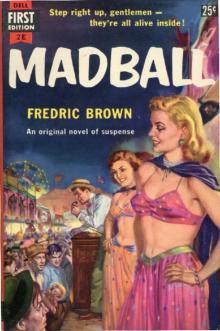 Madball
Madball Happy Ending
Happy Ending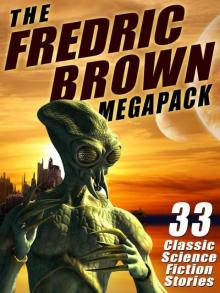 The Fredric Brown Megapack: 33 Classic Science Fiction Stories
The Fredric Brown Megapack: 33 Classic Science Fiction Stories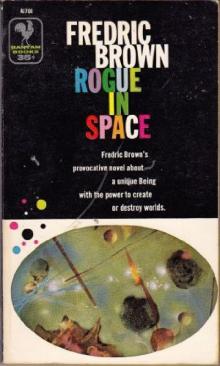 Rogue in Space
Rogue in Space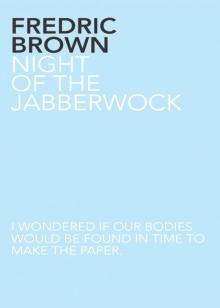 Night of the Jabberwock
Night of the Jabberwock The Dead Ringer
The Dead Ringer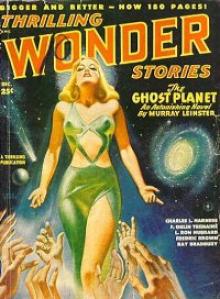 Knock
Knock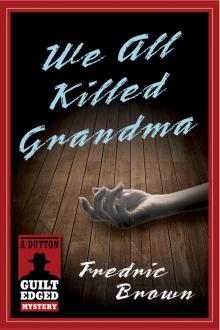 We All Killed Grandma
We All Killed Grandma Space On My Hands
Space On My Hands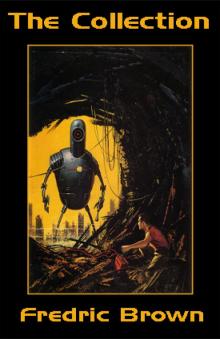 The Collection
The Collection The Second Fredric Brown Megapack: 27 Classic Science Fiction Stories
The Second Fredric Brown Megapack: 27 Classic Science Fiction Stories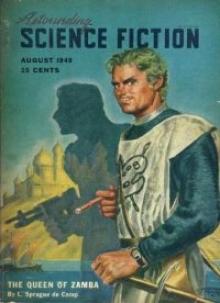 Letter to a Phoenix
Letter to a Phoenix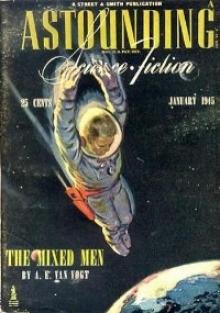 The Waveries
The Waveries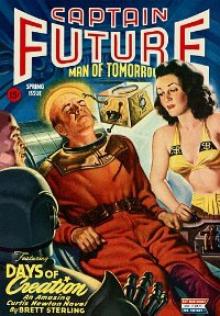 Nothing Sirius
Nothing Sirius The Deep End
The Deep End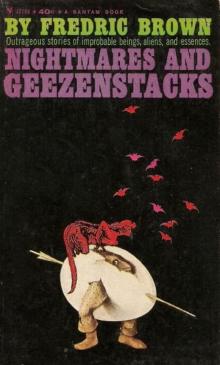 Nightmares & Geezenstacks
Nightmares & Geezenstacks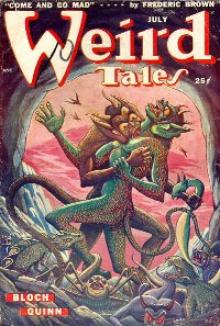 Come and Go Mad
Come and Go Mad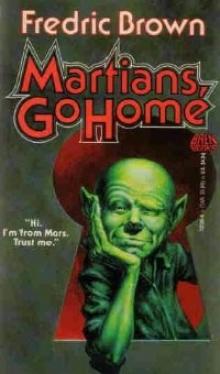 Martians, Go Home
Martians, Go Home